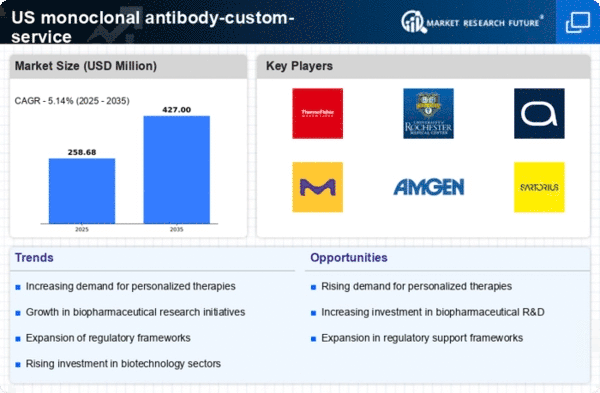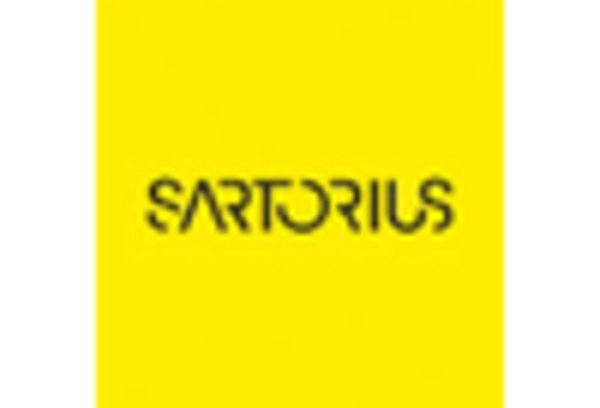Expansion of Biotech Startups
The monoclonal antibody-custom-service market is witnessing a notable expansion of biotech startups, which are increasingly entering the field with innovative approaches to antibody development. These startups often focus on niche markets and specialized applications, driving demand for custom services tailored to their unique needs. The US has become a hub for biotech innovation, with thousands of startups emerging in recent years. This influx of new companies is likely to stimulate competition and innovation within the monoclonal antibody-custom-service market. As these startups seek to differentiate themselves through unique antibody products, the demand for customized services is expected to rise, further propelling market growth.
Growing Prevalence of Chronic Diseases
The rising incidence of chronic diseases such as cancer, autoimmune disorders, and infectious diseases is a significant driver for the monoclonal antibody-custom-service market. According to the Centers for Disease Control and Prevention (CDC), chronic diseases account for 7 out of 10 deaths in the US, highlighting the urgent need for effective treatment options. Monoclonal antibodies have emerged as a cornerstone in the therapeutic arsenal against these conditions, leading to an increased demand for customized antibody solutions. The monoclonal antibody-custom-service market is likely to benefit from this trend, as healthcare providers seek tailored therapies that can enhance patient outcomes. This growing need for personalized treatment options is expected to stimulate further innovation and expansion within the market.
Rising Focus on Research and Development
The monoclonal antibody-custom-service market is significantly influenced by the increasing focus on research and development (R&D) within the pharmaceutical and biotechnology sectors. With R&D spending in the US exceeding $80 billion annually, companies are prioritizing the development of novel therapies, including monoclonal antibodies. This emphasis on innovation drives the need for custom services that can support the unique requirements of R&D projects. As researchers strive to create more effective and targeted treatments, the demand for specialized monoclonal antibody services is likely to grow. This trend suggests a promising outlook for the monoclonal antibody-custom-service market as it aligns with the broader goals of advancing medical science.
Increasing Investment in Biopharmaceuticals
The monoclonal antibody-custom-service market is experiencing a surge in investment from both public and private sectors. In recent years, biopharmaceutical companies have allocated substantial resources towards research and development, with expenditures reaching approximately $200 billion annually in the US. This influx of capital is primarily directed towards the development of innovative therapies, including monoclonal antibodies, which are pivotal in treating various diseases. As a result, the demand for custom services that facilitate the production and optimization of these antibodies is likely to rise. Furthermore, the increasing number of clinical trials, which often require tailored monoclonal antibodies, further propels the growth of the monoclonal antibody-custom-service market. This trend indicates a robust future for companies providing specialized services in this domain.
Technological Advancements in Antibody Production
Recent technological advancements in antibody production techniques are transforming the monoclonal antibody-custom-service market. Innovations such as recombinant DNA technology and hybridoma technology have significantly improved the efficiency and specificity of monoclonal antibody production. These advancements enable the rapid generation of high-quality antibodies tailored to specific targets, which is crucial for both research and therapeutic applications. As a result, companies offering custom services are likely to see increased demand as researchers and clinicians seek to leverage these technologies. The monoclonal antibody-custom-service market is poised for growth as these technologies continue to evolve, potentially leading to more effective and targeted therapies.
















